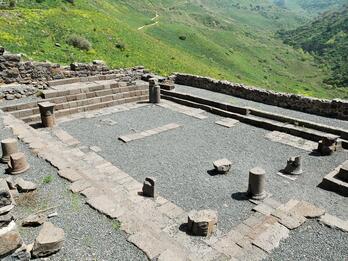R. Yoḥanan and Resh Lakish
One day, R. Yoḥanan was bathing in the Jordan [River]. Resh Lakish saw him and jumped into the Jordan, pursuing him. [R. Yoḥanan] said to [Resh Lakish], “Your strength [is fit] for Torah [study].” [Resh Lakish] said to him, “Your beauty [is fit] for women.” [R. Yoḥanan] said to him, “If you return [to the pursuit of Torah], I will give you my sister [in marriage], who is more beautiful than I am.” [Resh Lakish] accepted upon himself [to study Torah. Subsequently, Resh Lakish] wanted to jump back [out of the river] to bring [back] his clothes, but he was unable to return [as he had lost his physical strength as soon as he accepted the responsibility to study Torah upon himself].
[R. Yoḥanan] taught [Resh Lakish] Bible, and taught him Mishnah, and turned him into a great man. One day, [the sages] of the study hall were engaging in a dispute [concerning the following baraita: With regard to] the sword, the knife, the dagger, the spear, a hand sickle, and a harvest sickle, from when are they susceptible to ritual impurity? [It is] from the time of the completion of their manufacture.
[These sages inquired,] “And when is the completion of their manufacture?” R. Yoḥanan said, “[It is] from when one fires [these items] in the furnace.” Resh Lakish said, “[It is] from when one scours them in water, [after they have been fired in the furnace.” R. Yoḥanan] said to [Resh Lakish], “A bandit knows about his banditry,” [i.e., you are an expert in weaponry because you were a bandit in your youth. Resh Lakish] said to [R. Yoḥanan], “What benefit did you provide me [by bringing me close to Torah]? There, [among the bandits,] they called me: Leader [of the bandits, and] here, [too,] they call me: Leader [of the bandits.” R. Yoḥanan] said to him, “I provided benefit to you, as I brought you close [to God], under the wings of the Divine Presence.”
[As a result of the quarrel,] R. Yoḥanan was offended, [which in turn affected] Resh Lakish, [who] fell ill. [R. Yoḥanan’s] sister, [who was Resh Lakish’s wife,] came crying [to R. Yoḥanan, begging that he pray for Resh Lakish’s recovery]. She said to him, “Do [this] for the sake of my children, [so that they should have a father.” R. Yoḥanan] said to her: Leave your fatherless children, I will rear them (Jeremiah 49:11), [i.e., I will take care of them. She said to him,] “Do [so] for the sake of my widowhood.” He said to her, “And let your widows trust in Me (ibid.).”
[Ultimately,] R. Simeon ben Lakish, [Resh Lakish,] died. R. Yoḥanan was sorely pained over [losing] him. The rabbis said, “Who will go to calm [R. Yoḥanan’s] mind [and comfort him over his loss?” They said,] “Let R. Elazar ben Pedat go, as his statements are sharp,” [i.e., he is clever and will be able to serve as a substitute for Resh Lakish].
[R. Elazar ben Pedat] went and sat before [R. Yoḥanan. With regard to] every matter that R. Yoḥanan would say, [R. Elazar ben Pedat would] say to him, [“There is a ruling which] is taught [in a baraita] that supports your [opinion].” [R. Yoḥanan] said [to him], “Are you [comparable] to the son of Lakish? [In my discussions with] the son of Lakish, when I would state a matter, he would raise twenty-four difficulties against me [in an attempt to disprove my claim], and I would answer him with twenty-four answers, and the halakhah by itself would become broadened [and clarified]. And [yet] you say [to me, ‘There is a ruling which] is taught [in a baraita] that supports your [opinion].’ Do I not know that what I say is good?”
[R. Yoḥanan] went around, rending his clothing, weeping and saying, “Where are you, son of Lakish? Where are you, son of Lakish?” [R. Yoḥanan] screamed until his mind was taken from him [i.e., he went insane]. The rabbis [prayed and] requested [for God to have] mercy on him [and take his soul], and [R. Yoḥanan] died.
Translation adapted from the Noé Edition of the Koren Talmud Bavli.
Notes
Words in brackets appear in the original translation.
Credits
Published in: The Posen Library of Jewish Culture and Civilization, vol. 2: Emerging Judaism.



